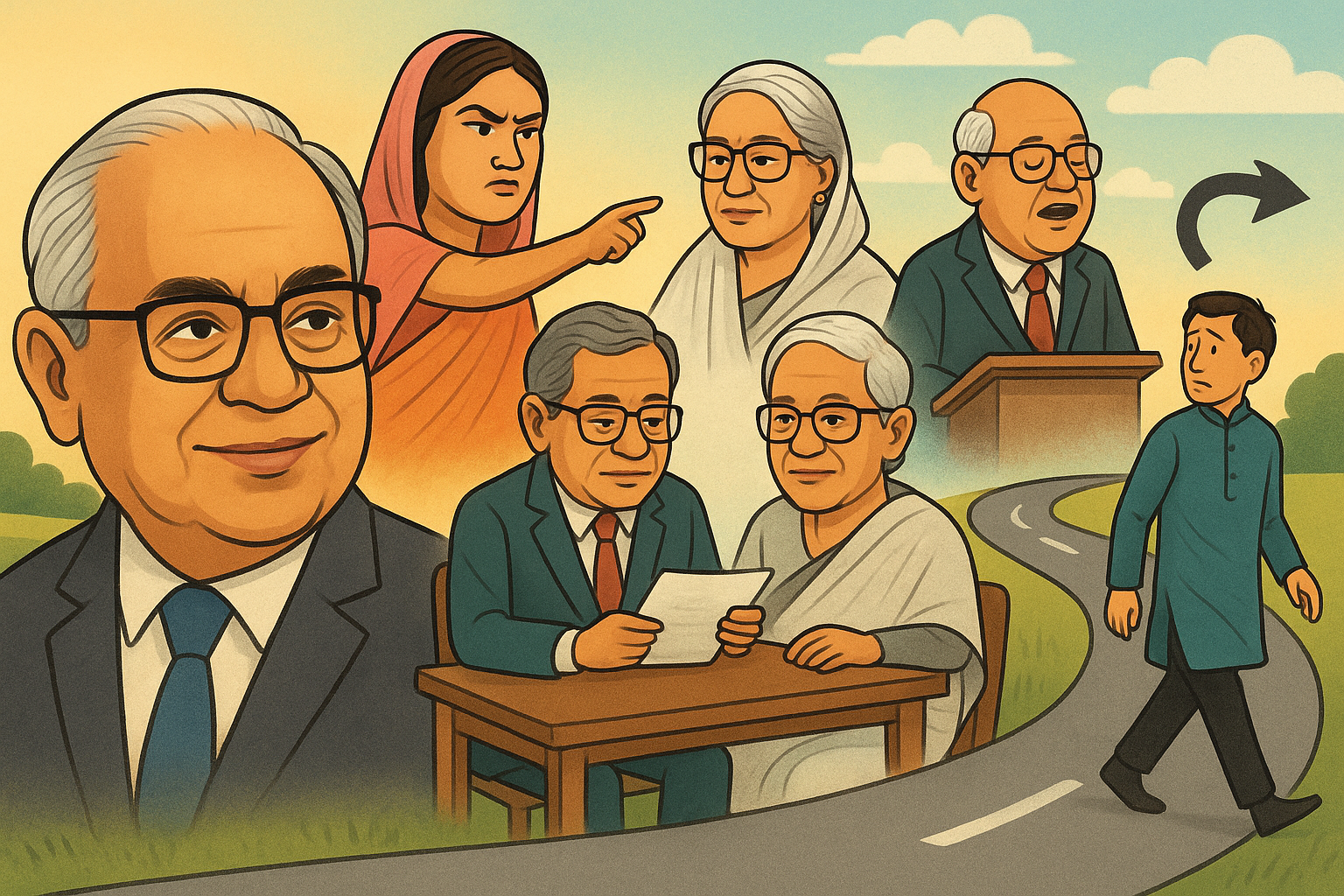Politics in Bangladesh is less about ideals and principles and more a game of names. Some carry weighty names but deliver little. “Huda” is a name that has become immortal not only in the pages of politics but also in the albums of satire. It is almost a political genre, a character-driven saga that resurfaces every election season– dressed anew, steeped in old conspiracies.
Let us begin with a linguistic detour. The word “Huda” originates from Arabic, meaning “the right path,” “guidance,” or hidayah. In Islamic terminology, “Huda” is the light that guides through darkness, leading one toward truth and justice. In essence, being “Huda” should have meant being a beacon of ideals and a pilgrim on the path of justice.
Alas!
In our political arena, those who have carried the name “Huda”, sometimes at the forefront, sometimes as shadowy figures, have mostly walked the exact opposite path: from light to darkness, from ideals to self-interest, and from guidance to misguidance. Though they bore the name “Huda”, their actions spelled gomrah (astray).
There was once a “Huda” who was a barrister. He was known as the importer of BBC-CNN into the screens of BTV. For this, he earned public praise. Even as a minister under Khaleda Zia, he supported Sheikh Hasina’s caretaker government model– earning applause from the League camp. But he lost his ministerial post and became a thorn in his own party’s side.
This “Huda”, a math-whiz, would return as a minister. But when the party hit rough waters, he made another U-turn– sometimes in opposition, sometimes pro-government, sometimes against his own party, sometimes forming a new one, only to dismantle it again. He became a recurring topic in Bangladesh’s political gossip.
His wife too was a “Huda”, a reputed lawyer who later gained infamy through a few high-profile cases. Their daughter, another “Huda”, took the reins of her father’s political outfit. But since August 5 last year, she has gone missing.
A family of “Hudas”, deeply entrenched in politics. Since British times, there were many “Hudas” in the subcontinent. But in the past two decades, the “Hudas” have been most visible as political referees. Strangely, Bangladesh had three consecutive Election Commissions headed by men named “Huda”. People used to call them “Huda Commission”.
During the 1/11 political crisis, when the emergency government urgently needed faces that looked honest and neutral, they handed the baton to one “Huda”. He navigated through with moderate success, wielding the baton of “temporary transparency.”
Then came another “Huda”, the one who presided over a historic election where voting wasn’t even needed. One hundred and 53 candidates were declared winners without a single vote cast. Public expectations went under the table, and ballot papers became beyond questioning. This “Huda” was a magician of sorts able to form governments without polling.
And then came the next “Huda”, the third in a row. The referee’s whistle was again in the hands of a “Huda”, one even more audacious than his predecessors. He showcased a magic trick where voters woke up in the morning only to discover their votes had been cast the night before! Ballot papers floated like dreams.
A top face from that vote earned the title “Queen of Midnight Ballots.” And the new generation now recognises “Huda” as “Huda of the Night Vote.” Most recently, he reappeared, not on the political stage but as a character in a Facebook live.
“Huda” is not merely a name, it’s a symbolic consciousness. Sometimes a minister, sometimes a commissioner, sometimes an accused under trial. In politics, a “Huda” guarantees drama, chaos, and eventually a dash of comedy. You could write a play around the name, sculpt a novel’s central character, or even base a political science thesis on it: “Refereeing Democracy: The Huda Doctrine in Delusion.”
Watching these “Hudas”, one thing becomes clear: in the maze of Bangladeshi politics, even if nothing else persists, “Huda” will remain in discussion. Because it’s the kind of name that signals trouble is near.
And a humble request: if anyone in future politics– or as a political referee– chooses to use the name “Huda”, they should be required to complete one essential course:
“Avoiding Humourless Hudaism: A Realistic Political Workshop for Hudas.”
In Bangladesh’s political dictionary, “Huda” is an inseparable word. Someone may try to delete it in the future, but how can a name like “Huda” be cancelled? It’s a name etched into history. And history, in Bangladesh, often spells “Huda”.


